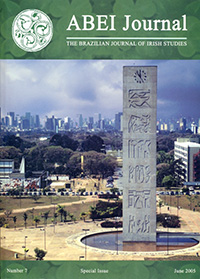Demystifying Irish History in Roddy Doyle’s A Star Called Henry
DOI :
https://doi.org/10.37389/abei.v7i1.184265Mots-clés :
Roddy Doyle, A Star Called Henry, Irish historyRésumé
Despite its appearance of rigour, the claims of reliability put forward by history have been repeatedly contested. Although this discipline pursues an accurate recollection of objective facts, it seems that it has been exposed to subjective criteria and ideological constraints that have often resulted in biased considerations of particular events. In the case of A Star Called Henry (1999), Roddy Doyle approaches life in Dublin at the beginning of the twentieth century, a period in which the Irish nationhood underwent a decisive transformation. The novel, however, explores these crucial years from the perspective of an ordinary character, Henry Smart, whose sceptical approach to the turbulent reality of his time clashes with the atmosphere of patriotism and nationalistic fervour of the pro-Irish combatants. The aim of this study is to analyse Doyle’s re-examinations of Irish history, which, in the novel, emerges as the metaphorical landscape that embodies the entire narration. My analysis will, therefore, seek to detect the way A Star Called Henry subverts and ironises about assumptions that have been long unquestioned, presenting, instead, a vision that demythologises key moments in Ireland’s past.
Références
Allen, Brooke. “Silence, Exile, Cunning”, The New Criterion 18.3 (1999): 60-65.
Boyce, D. George. “1916, Interpreting the Rising”, The Making of Modern Irish History: Revisionism and the Revisionist Controversy. Eds. D. George Boyce and Alan O’Day. London and New York: Routledge, 1996. 163-85.
Coogan, Tim Pat. The I.R.A., London: HarperCollins, 1993.
Davis, William A. “Roddy Doyle’s Irish Century.”, 1999. Available at http://www.boston.com/stpatricksday/literature/doyle_globe1.htm.
Doyle, Roddy. A Star Called Henry, London: Vintage, 1999.
Kostick, Conor and Lorcan Collins. The Easter Rising. A Guide to Dublin in 1916, Dublin: The O’Brien P., 2000.
Lee, J. J. Ireland 1912-1985. Politics and Society, Cambridge: Cambridge UP., 1989.
Litton, Helen. Irish Rebellions 1798-1916. An Illustrated History, Dublin: Wolfhound P., 1998.
O’Brien, Brendan. A Pocket History of the I.R.A., Dublin: The O’Brien P., 1997.
Wachel, Eleanor. “In Conversation with Roddy Doyle.” Brick 64 (2000): 62-70.
White, Caramine. Reading Roddy Doyle, Syracuse, New York: Syracuse UP., 2001.
Téléchargements
Publiée
Numéro
Rubrique
Licence
(c) Copyright Juan Francisco Elices Agudo 2005

Ce travail est disponible sous licence Creative Commons Attribution - Pas d’Utilisation Commerciale 4.0 International.


